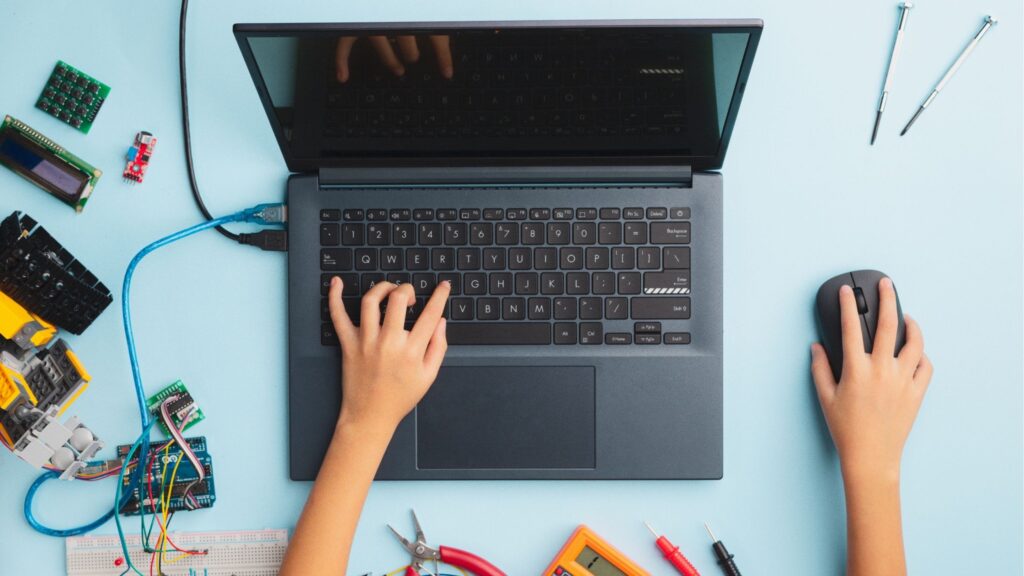Looking for the best laptop for coding students in India? This guide covers key specs, buying tips, and top budget-friendly options for web development, data science, and more.
In today’s tech-driven world, having a reliable laptop is a necessity, especially if you’re a student learning to code. Whether you’re building websites, designing apps, diving into machine learning, or writing your first lines of Python or Java, your laptop becomes your most essential tool.
But here’s the problem: the market is flooded with options. Some are flashy but overpriced, others seem affordable but underperform when it matters most, like running multiple tabs, compiling code, or using heavy IDEs like Visual Studio or Android Studio.
That’s why picking the right laptop can feel confusing. But it doesn’t have to be.

This guide is here to simplify your decision-making. We’ll break down:
- The must-have features (like RAM, processor, battery life, display size, and keyboard comfort)
- The ideal specs for different branches of coding (web development vs. data science, etc.)
- Some budget-friendly options in India that offer great value for students
No fluff, no complex jargon, just clear, practical advice so you can invest in a laptop that grows with your coding skills.
Whether you’re a beginner in B.Tech, self-learning online, or preparing for tech placements, this post will help you choose a laptop that keeps up with your pace and potential.

1. Processor (CPU): The Heart of Your Laptop
The CPU handles all the instructions from the software you run. For coding, especially when using IDEs like Visual Studio Code, IntelliJ, or PyCharm, a strong processor ensures smooth performance.
- Recommended: Intel i5/i7 (12th Gen or newer), AMD Ryzen 5/7 (5000 series or newer), or Apple M1/M2/M3 chips.
- Why it matters: Faster processors reduce lag when compiling code or running multiple apps.
2. RAM: Smooth Multitasking
Coding often involves running code editors, browsers, terminal windows, and possibly virtual machines simultaneously. RAM is what keeps everything running without slowdowns.
- Recommended: Minimum 8GB; ideally 16GB or more.
- Tip: If you’re working with large projects or Android Studio, go for 16GB+.
3. Storage: SSD vs HDD
Speed is crucial when saving files or launching programs. SSDs (Solid State Drives) are significantly faster than traditional HDDs.
- Recommended: At least 256GB SSD; 512GB if you work with large datasets or multiple tools.
- Why SSD: Faster boot times, quicker file access, and overall smoother experience.
4. Operating System: macOS, Windows, or Linux?
Your choice depends on your field of study and personal preferences.
- Windows: Versatile, widely supported, and great for .NET or Windows-based development.
- macOS: Preferred by iOS developers; Unix-based like Linux, which many coders like.
- Linux: Excellent for learning programming fundamentals and working in open-source environments.
Note: Some laptops let you dual-boot or run Linux in a virtual machine.

5. Battery Life: Code Anywhere, Anytime
As a student, you’ll be coding in class, cafés, libraries, and labs. A long battery life gives you flexibility.
- Recommended: At least 8 hours of battery life.
- Tip: Look for laptops with fast charging if you’re always on the move.
6. Keyboard and Display: Comfort is Key
You’ll spend countless hours typing. A comfortable keyboard and quality display make a big difference.
- Keyboard: Choose one with good travel, feedback, and ideally backlighting.
- Display: Full HD (1080p) minimum. Consider 14–15 inches for a balance of portability and screen real estate.
7. Portability and Build Quality
Your laptop should be light enough to carry daily but sturdy enough to withstand travel.
- Weight: Aim for under 4 lbs (1.8 kg) if portability is a priority.
- Build: Metal or high-quality plastic chassis offer better durability.
8. Top Laptop Picks for Coding Students in 2025
Here are a few laptops that offer great value and performance:
- Apple MacBook Air M3 (2025): Lightweight, powerful, long battery life. Great for most coding tasks.
- Dell XPS 13: High-end Windows option with sleek design and strong specs.
- Lenovo ThinkPad X1 Carbon: Known for its keyboard and reliability.
- ASUS ZenBook 14: Affordable, portable, and packed with features.
- Framework Laptop (2025): Modular, repairable, and ideal for tinkerers.

Final Thoughts
Choosing the right laptop for coding as a student is all about finding the right balance between power, portability, and price. It’s not just a short-term purchase, it’s an investment in your learning and future career. Make sure your device has enough performance to handle your projects today and grow with your skills tomorrow.
A reliable laptop won’t just run code, it’ll help you build confidence, stay consistent, and unlock your full potential as a future developer. Choose smartly, and let your laptop become your most trusted companion on this exciting journey.

